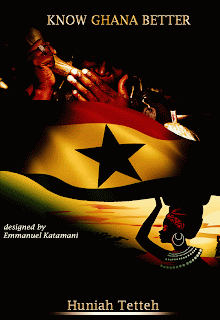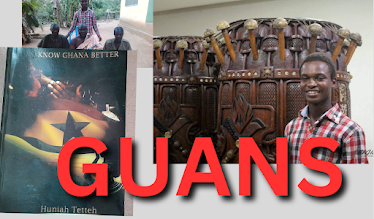THE GHANAIAN-PIDGIN LANGUAGE
Modern Ghana has seen
the need to have a common language which will bridge the language barrier among
its people. Then English was accepted as the language to do that but most
people were finding it difficult to learn the English Language. English is
indeed the official language but then only about half of the Ghanaian population
is able to speak English fluently.
The others will either
understand it very well and they will not be able to fluently speak it, or they
just do not understand it at all. This is a hindrance to the development of the
nation Ghana since its inhabitants have difficulty communicating among
themselves. This called for some selected local languages by the government to
be taught in schools. They are the government sponsored languages that we had
earlier learnt about. Yet, some Ghanaians due to certain perceptions were not
even willing to learn the languages being taught in schools. There are numerous
reasons to that but then a few of those reasons I gathered from a public poll are
listed below:
1. They cannot
abandon their language and learn the language of the other tribe. They feel
they are giving prestige to other languages rather than theirs.
2. Others also perceived being literate in their
local language is useless since it will not be of any benefit to them in the
sense of moving abroad. They are of no use outside the borders of Ghana.
3. Most of the
schools painted the local languages as an abomination to speak since “speaking
them will make you “a savage”. In fact, students were over-tormented with
lashes just for speaking their local languages (vernacular) in schools.
4. The Education
policy for teaching local languages in Ghana is to teach in solely that local
language or L1* of the community without taking into consideration non-speakers
of that community’s L1.
This I experienced in Tamale when some language teachers taught Dagbanli
in solely Dagbanli without ever speaking English. So I asked if all the pupils
could speak or understand Dagbanli and about 35% of the class protested that
they have no idea what goes on anytime it is Dagbanli class. I asked the
teacher if he is teaching Dagbanli students or he was teaching everyone. Of
course, he gave the obvious answer, everyone.
I continued if he was teaching everyone then, why does he not translate
into English for the other students to understand after he is done speaking in
Dagbanli. He claimed the Education policy forbids teaching native languages in
English; without taking into consideration the non-speakers.
All this had gone a long way to cause more harm than
good.
1. Students
under all this torture just drop out from school so as to be free in speaking
their local languages.
2. Others still complete not being able to speak the
English language and even fail most exams due to the hatred they develop for
the language as a result of the beatings.
3. The Ghanaian language teaching syllabus or policy
has loop holes which might not have been fixed yet.
So the language
barrier was fairly minimized since the few who can speak the English and at
least local languages acted as interpreters for their family and for other
elderly people. But that soon changed around the year 2004 when Ghanaians were
embracing the Nigerian culture through movies and saw the need to adopt their
form of English, the Pidgin which
they call PIJIN.
Ghanaians after
continuous interaction with the Nigerian
Pidgin gradually developed their own Pidgin. Ghanaians started by speaking
the Nigerian Pidgin but with time, they developed their own dialect or version
of the Pidgin which came to be known as Piji.
The Piji is intelligible* with the
Nigerian Pidgin but partially related to it presently.
It combines Ga, Twi and the English. This was because the Ghanaians migrated totally from the
way the Nigerians speak it to their own style. Ghanaians got the idea from the
Nigerian Pidgin thus, they understand that completely but the Nigerians
normally struggle to understand the Ghanaians due to the Ghanaian Pidgin
vocabulary shift.
Currently the Piji is
accepted all over Ghana but it has not been standardized yet. Every day, new
words are being developed to move it far away from English thus, it may take
about some few years to be standardized and attain the status of a Language.
But currently, it is in a dialectic state that is to say it is a Pidgin*
currently. If it finally gets standardized, it will then be a creole.
The people of Ghana
speak the dialectic Piji fluently unlike the English. It is now breaking the
language barrier of the people and it has come to stay. Piji is a half toned*
(like the accent of English, German etc.) dialect. Although Akan is Vowel toned* and Ga is Direct toned*, they attain half-tone in
the Piji language. Let us first look at the phonetic structure between Piji and
Nigerian Pidgin English.
|
PIJI |
PIJIN-NIGERIA |
ENGLISH |
|
Adey kam oo |
Adey kam now |
I am coming |
|
Adey go shut nibis |
Adey go sell things |
I am going to sell |
|
Ugo du make atoo/gbee
u hier |
U go do maabeat u
for here |
Do not let me beat
you |
|
Bis am av mi |
Ask am giv me |
Ask him for me |
|
Widey chop oo |
Wedey shop |
We are eating |
|
Weney nibis edey
bis u? |
Wish kan tin edey
ask u? |
What is he/she asking
you? |
The comparison above
I hope will give you a feel of the Piji if you are not Ghanaian. Currently,
some part of the Piji is standardized which we are going to take a look; the
pronoun system, the conjugation system and the sentence structure.
Piji will one day be
standardized. A standardized Pidgin is accepted as a national language like the
Jamaicans, Sierra-Leoneans have done. A standardized Pidgin is called a Creole.
THE PRONOUN SYSTEM: The Piji uses the pronominal system of English
but the pronunciation and spellings are not the same, yet they could be easily
read and be well understood even if a foreigner with little or no idea about
Piji is reading it or he is interacting with a Ghanaian Piji speaker. Below is the
list of pronoun pronouns.
My spelling method reflects the pronunciation or what is also known as “pronounce
what you see” way of spelling and not as in the English Language.
|
SUBJECT |
OBJECT |
|
|
A |
Mi |
1st
Person Singular |
|
U (Yu) |
U (Yu) |
2nd
Person Singular |
|
I (E) |
Am |
3rd
Person Singular |
|
Wi |
Wi |
1st
Person Plural |
|
U (Yu) |
U (Yu) |
2nd
Person Plural |
|
Dem |
Dem |
3rd
Person Plural |
THE CONJUGATION
In Piji, conjugation
is very simple. There is nothing
like subject verb agreement as in “I am, you are, he is, etc.” Also the
verbs in their infinitive states are the same as in the past, future etc. The
conjugations are what we shall call in English the subjunctive mood. There is
no indicative mood whatsoever.
There is only one
irregular verb “bi” which is the
same as the English “To be.” The
verb “Bi” has a different present
and continuous conjugation. Let us look at it below.
|
RYDIS(PRESENT) |
DE CONTINIOS |
PAS(PAST) |
PAS CONTINIOS |
|
Abi (I am) |
Adey (I am) |
Na abi (I was) |
(Na) adey (I am) |
|
Ubi |
Udey |
Na ubi |
(Na) udey |
|
Ebi |
Edey |
Na ebi |
(Na) edey |
|
Wibi |
Widey |
Na wibi |
(Na) widey |
|
Ubi |
Udey |
Na ubi |
(Na) udey |
|
Dembi |
Demdey |
Na dembi |
(Na) demdey |
|
FIUCHA (FUTURE) |
FIUCHA CONTINIOS |
DE PERFET |
|
Ago bi (I will be) |
Ago dey (I will be) |
Av bin (I have
been) |
|
Ugo bi |
Ugo dey |
Uv bin |
|
Ego bi |
Ego dey |
E az bin |
|
Wigo bi |
Wigo dey |
Wiv bin |
|
Ugo bi |
Ugo dey |
Uv bin |
|
Demgo bi |
Demgo dey |
Dev bin |
THE SENTENCE STRUCTURE
The sentence
structure in Piji is quite similar to English but it retains a very simple
grammatical form which non-Piji speakers can easily pick up and start speaking.
The pattern is pronoun + conjugate of “bi” (future, past etc.)
+ verb + object. That is for both positive and negative. For you to know,
the continuous of any verb in Piji uses “dey”. For instance, widey go (we are going), demdey choo (they
are eating), etc. so it will be safe for you to know the verbs.
Now to say for
instance “I am typing the contents of KNOW GHANA BETTER” it will be “Adey taip
de nibis wey ego dey for KNOW GHANA BETTER inners.”
Negatives: for negative sentences in the Piji language, it is
formed just by bringing “no” attached to the verb. This form is the same
irrespective of future tenses, present, past or whatsoever. Here are some
examples.
1. Ano go gali go
skul agen – I will not walk to school again/any longer/anymore
2. Eno bi de person (per
–sorhn) wey ewan fait plas u? – Is he not the person who wanted to fight you?
3. Eno dey tron pass
notin hier – it is not stonger than anything here
Know that “Dey” can also mean “to stay.”







Comments
Post a Comment
Thank you! Gladly appreciate your feedback. You can also reach out personally via whatsapp or follow me on youtube/facebook Huniah Tetteh.